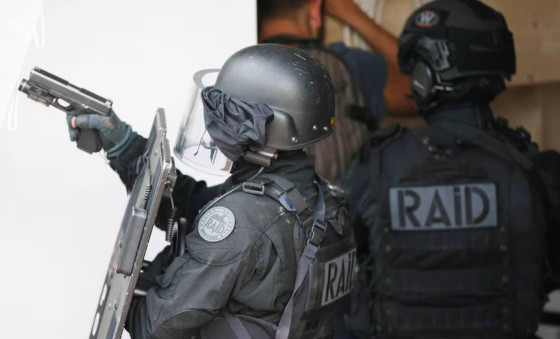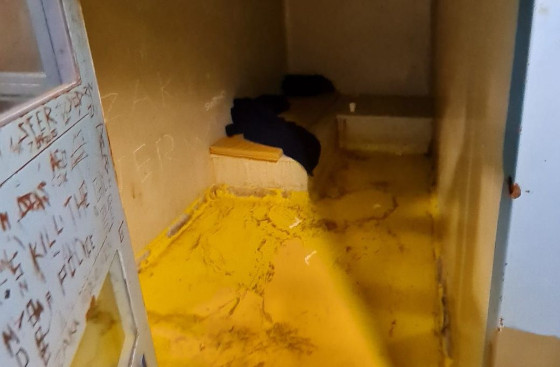The Police Raids Against MISA in France, November 28, 2023. 3. The Yogis’ Complaints About the Police
by Susan J. Palmer
The story they told a leading Canadian scholar is that in the police stations the yoga students’ rights were repeatedly violated.
Part 3 of 5. Read the first part and the second part.

In the previous article of this series, I described how the French police raids of November 28, 2023, against students of MISA, the Movement for the Spiritual Integration into the Absolute, were perceived by the MISA yoga students who were there and had returned to Romania, where I interviewed some of them in January 2024. They complained that their rights were repeatedly violated.
Many of my informants described how their demands for a lawyer were ignored or brushed aside: “They said I could have one call, but it had to be in France. I said I would not sign anything without my Romanian lawyer, but they said there was a lawyer at the police station who was free. I said I need my own lawyer. They said, ‘No, no, no! You are jeopardizing the investigation!’ They were not pleased.”
Another woman asked if she had a designated lawyer. “They said, fine, they would call a lawyer later when we went to the police station. But I said I would not sign anything except in the presence of a lawyer.”
A few of the detainees were given an “in-house” lawyer, who advised them to “tell the truth or you will be jeopardizing the investigation.” In the two instances where a Romanian detainee was able to contact a French lawyer unaffiliated with the police, the lawyer strongly advised, “Don’t say anything, don’t sign anything. Wait until you are in the presence of the magistrate.”
But even the external French lawyers did not always prove helpful, according to one detainee: “On the second day my lawyer arrives. He has the same attitude as the prosecuting attorney. He said, ‘Listen, you are celebrities in the mass media, you are a Tantric cult, so it would be good to speak up. I am sure you will remain in custody for more than 48 hours.’ ‘Why are you so sure?’ I asked. He replied, ‘Honestly, with what you are accused of, I am sure it will be long’.”
Several informants complained they were “insulted” by the police. One Romanian reports he was asked by the police if he would agree to take a psychological test that would prove he was psychically manipulated. “I said no. Do I look like a person who can’t make my own decisions?”
Some complained of being “treated like criminals”: “We had to give our fingerprints DNA samples, our saliva samples, they took photos with ID.” Others were asked insulting questions by their interlocutors. One man said he was asked, “Do you have sex with men?” Another man was asked, “Do you rape your girlfriend?” He replied, “You should be kidding! Why don’t you ask her?”
One woman was asked leading questions: “The police officer who was interrogating me was talking on the phone with his boss and getting more stressed, and he got aggressive with me just to impress his boss. He asked loaded questions like, ‘When you were drugged……. When you were raped……. When you had sex with your brother-in- law…….’ It sounded like a comedy in a stupid movie.”

All the detainees I interviewed described unpleasant and harsh prison conditions: “My cell was 2×3 meters and very cold with a concrete floor and a Turkish toilet—very filthy and smelly. I had sore muscles and did a lot of yoga. I could not sleep. There was no night and no day. I had two cell colleagues who were very hostile. A policeman took……. brought us to a cell that was very cold. I asked many times if I could have a second blanket, or toilet paper, there wasn’t even a glass where we washed, or plastic cups. There was a thin mattress on the cement floor, one blanket, no pillow. Lights were on all night and there were drug addicts with withdrawal symptoms screaming their heads off, and all night there were prisoners brought in and out.”
My informants complained of being very uncomfortable in police custody. They were interrogated for up to five hours at a time, often handcuffed to a chair, and had to beg to be escorted to the toilet. Many were deprived of food and water during the interrogations: “When we arrived at the police station the translators were waiting. They gave us some food—but then we realized it was from our own storage unit in the house, like they gave us these very familiar Romanian biscuits.”
In most cases, after being held for 48 hours, the detainees were suddenly told they had to leave. This usually occurred between 10:30 p.m. and midnight, when they were promptly escorted to the exit of the police compound and locked out. They found themselves on the street late at night with their ID, but no money or cellphone. One helpful policewoman at the Nanterre police station had advised two of my informants to walk to the nearest metro station and told them there would be no conductors on duty this late, so they could sneak in under the turn style and return to Paris.
But one man told her he needed to catch a train to the country house, and he had no money to buy a ticket. This policewoman then gave him the most extraordinary advice: “You don’t need money,” she told him. “Just watch the black people and do what they do.” “She told me to “go to the part of the platform where the ‘black people’ were standing,” the man reported, “because they know how to sneak on trains without paying. So I did, and it worked!”
Several detainees who had been just released had to ask passersby if they could borrow their cellphones, so they could contact friends for help. Most of them contacted their lovers in Romania who bought their airline tickets so they could return home.
For one man, being released was almost as shocking as being raided: “Then, suddenly, I was released. I found it very disturbing that they never explained why we were suspects. One minute we are under judicial control, and the next: ‘You are free. Grab your things and go!’ As soon as I got out, I was running down the street, away from the police station, afraid they might reconsider.”

These interviews tell us that the police refused to inform most these Romanians in their own language about the allegations for which they were being held. They denied them their right to inform someone of their detention, which under article 63-2 CPP is the legally required treatment of a suspect held in “garde à vue”. Moreover, the police denied most of them the right to legal advice during the 48 hours of their “garde à vue.” which under art 63-4 CPP is “the primary guarantee for the proper treatment of the suspect.”
It appears likely that the police figured that, since the detainees were the “brainwashed,” powerless members of a “secte,” and non-French to boot, they could get away with cutting corners in trying to extort confessions and incriminating signatures.
**********
About the author
Susan J. Palmer is an Affiliate Professor in the Religions and Cultures Department at Concordia University in Montreal. She is also directing the Children on Sectarian Religions and State Control project at McGill University, supported by the Social Sciences and the Humanities Research Council of Canada (SSHRC). She is the author of twelve books, notably The New Heretics of France (Oxford University Press, 2012).
yogaesoteric
March 14, 2024
Also available in:
 Română
Română
